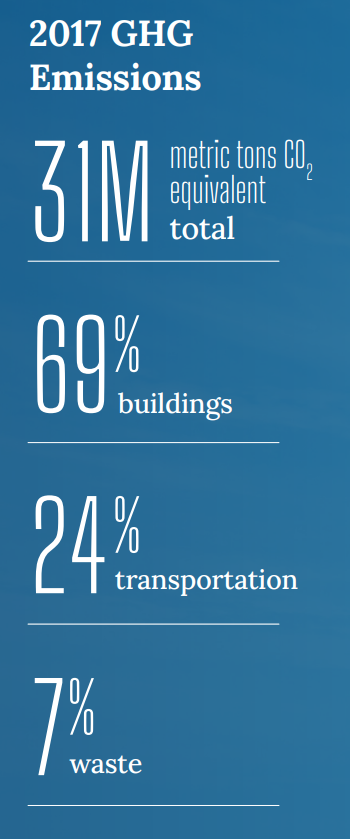Electrify Chicago
An independent tool for viewing City of Chicago building data
According to the
2022 Chicago Climate Action Plan,
69% of Chicago's emissions come from buildings, making
building emissions our biggest challenge and our biggest opportunity as a city
to tackle climate change. At Electrify Chicago, we showcase building performance using
publicly available data supplemented by community-submitted photographs and building
owners.
Start by looking at Chicago's buildings with the highest greenhouse gas intensity i.e. emissions per square foot. Large, efficient, buildings can perform much better than very inefficient small buildings on this metric.
New Article
📰 $30 Million In Missed Fines
The City Of Chicago failed to collect $30 million in potential fines from the building benchmarking ordinance, reducing transparency and accountability.
Legislative update! 🎉
As of late January 2024, legislation is being introduced to require new use more efficient forms of water and space heating, via the Clean And Affordable Buildings Ordinance (CABO), which will reduce the number of highly polluting and inefficient buildings that end up on this site.
If you're in Chicago,
write to your alderman to support the CABO!
Chicago Buildings by Greenhouse Gas Intensity
Note: Data includes large Chicago buildings with data from 2022, unless explicitly stated otherwise.
Note: This data only includes buildings whose emissions are reported
under the
Chicago Energy Benchmarking Ordinance. According to the City “As of 2016,
this list includes all commercial, institutional, and residential buildings larger than
50,000 square feet.” This dataset is also then filtered to only buildings with
reported emissions > 1,000 metric tons CO2 equivalent.
The latest year of data is from 2022, but we update the site regularly when new data is available, and some buildings may have failed to report that year, and only have older data available.
| Property Name / address | Primary Property Type |
Greenhouse Gas Intensity (kg CO2 eq./sqft) |
Total Greenhouse Emissions (metric tons CO2 eq.) |
|---|---|---|---|
|
Midway Square
5109 5151 S PULASKI RD
| Strip Mall | 6.3 kg/sqft
Lowest 48%
| 351 tons
Lowest 12%
|
|
Chicago City Day School
🕰️
541 West Hawthorne Place
| K-12 School | 6.3 kg/sqft | 546 tons |
|
Parkside Elementary Academy -CPS
🕰️
(CPS)
6938 S E End Ave
| K-12 School | 6.3 kg/sqft | 472 tons |
|
Flair Tower
222 W Erie St
| Multifamily Housing | 6.3 kg/sqft
Lowest 48%
| 1,617 tons
Highest 29%
|
|
4827 N SHERIDAN RD
4827 N SHERIDAN RD
| Multifamily Housing | 6.3 kg/sqft
Lowest 48%
| 1,033 tons
Highest 44%
|
|
00806-The Hallmark
2960 N Lake Shore Dr
| Multifamily Housing | 6.3 kg/sqft
Lowest 48%
| 2,731 tons
Highest 16%
|
|
1111 N. Dearborn St
1111 N. Dearborn St
| Multifamily Housing | 6.3 kg/sqft
Lowest 48%
| 2,087 tons
Highest 22%
|
|
Chicago Swissotel
323 E Wacker Dr
| Hotel | 6.3 kg/sqft
Lowest 48%
| 5,621 tons
Highest 6%
|
|
537 S DEARBORN ST
537 S DEARBORN ST
| Multifamily Housing | 6.3 kg/sqft
Lowest 48%
| 490 tons
Lowest 26%
|
|
1380
🕰️
4730 W Irving Park Rd
| Retail Store | 6.3 kg/sqft | 2,279 tons |
|
Fairmont Care Center
🕰️
5061 N PULASKI RD
| Senior Living Community | 6.3 kg/sqft | 630 tons |
|
70 76 E CEDAR ST
70 76 E CEDAR ST
| Multifamily Housing | 6.3 kg/sqft
Lowest 48%
| 478 tons
Lowest 24%
|
|
2510 W IRVING PARK RD
2510 W IRVING PARK RD
| Multifamily Housing | 6.3 kg/sqft
Lowest 48%
| 205 tons
Lowest 2%
|
|
5501 5511 W WASHINGTON BLVD
5501 5511 W WASHINGTON BLVD
| Multifamily Housing | 6.3 kg/sqft
Lowest 48%
| 753 tons
Lowest 43%
|
|
544 W MELROSE ST
544 W MELROSE ST
| Multifamily Housing | 6.3 kg/sqft
Lowest 48%
| 320 tons
Lowest 10%
|
Data Source:
Chicago Energy Benchmarking Data
